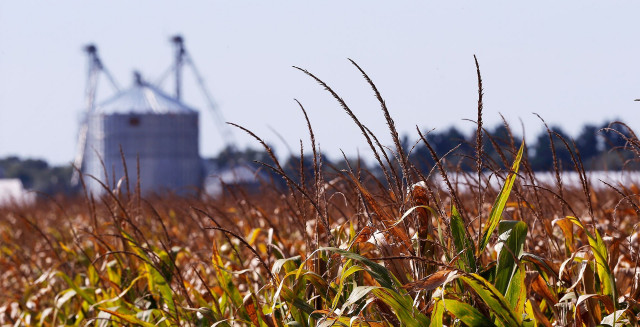Farmers – a neglected lot for decades
Policies of successive govts have been pro-industry whereas growers have suffered

PHOTO: REUTERS
The 2013-18 tenure of the Pakistan Muslim League-Nawaz (PML-N) government proved quite damaging for the agriculture sector when it posted a negative growth and cotton production hit its lowest in recent history.
During the PML-N’s five-year administration, the focus had mainly been on textile tycoons while the farmers were at the mercy of these businessmen. In 2015-16, the agriculture sector recorded a negative growth of 0.19% against growth projection of 3.9%, which indicated the lack of attention paid to the farm sector.
That government also allowed cotton import from India at zero duty, benefitting Indian farmers and domestic textile millers whereas local growers continued to suffer.
Cotton production had been virtually stagnant since 1991-92, fluctuating in a range of 10 to 12 million bales annually. The harvest fell to 9.9 million bales in 2015-16 compared to average consumption of 15 million bales, turning Pakistan a net cotton importer.
A committee listed different causes for the stagnant cotton harvest, which included the use of old first-generation rather than fourth-generation Bt technology, absence of better quality seeds, lack of measures to tackle cotton leaf curl virus, low processing quality at ginning factories and high contamination levels in the produce. These factors brought down the income of cotton farmers and led to a 20% reduction in the area planted with the crop from 2004 to 2016.
In 2016, the Pakistan Tehreek-e-Insaf (PTI) urged the then government to immediately impose an agriculture emergency and address the challenges faced by the farmers. Later, when the PTI came to power in August 2018, its government decided to declare an agriculture emergency as part of its programme of first 35 initiatives under the first 100 days of administration in a bid to ensure a decent income for the farmers.
The government has formed a task force for the sector comprising Finance Minister Asad Umar, Adviser to Prime Minister on Commerce, Textile and Industry Abdul Razak Dawood and Minister for Foreign Affairs Shah Mahmood Qureshi. Another task force has also been constituted to help improve the livestock sector and undertake necessary reforms. The minister for national food security will work on the livestock sector.
However, the government has so far failed to address the major challenges encountered by the farmers, who have a dominant share in the economy as they produce many key crops. Cartels and mafias have influenced power corridors as many industries are now receiving subsidies.
The fertiliser industry is getting subsidised gas but urea prices have been increased, which has raised the cost of inputs for the farmers.
Separately, the textile industry has started receiving electricity from the national grid at a subsidised tariff. The powerful lobby has also managed to get a subsidy of Rs25 billion on gas supply to their captive power plants.
However, when the Ministry of National Food Security and Research presented a case to the Economic Coordination Committee (ECC) for raising the wheat support price, the rate was kept at the same level of Rs1,300 per 40 kg, which had been in place for the last four years.
The government also allowed sugar barons the export of sweetener but it was linked with clearance of outstanding bills of the farmers. However, sugar millers refused to start the crushing season unless that condition was withdrawn, forcing the PTI government to remove the condition.
This is a tale of continued suffering for the farmers. The PTI government has so far not managed to take revolutionary measures under the agriculture emergency to improve the condition of deprived farmers, particularly the small ones.
The farming community had been left at the mercy of cartels in the past and nothing significantly different is being witnessed under the current government. If the same challenges persist, the time is not far when the country will start facing food insecurity.
The writer is a staff correspondent
Published in The Express Tribune, January 14th, 2019.
Like Business on Facebook, follow @TribuneBiz on Twitter to stay informed and join in the conversation.



















COMMENTS
Comments are moderated and generally will be posted if they are on-topic and not abusive.
For more information, please see our Comments FAQ